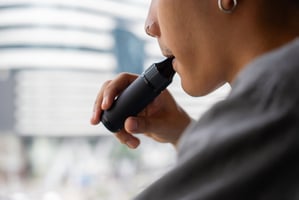American Heart Association Issues Recommendations on E-Cigarettes
 |
The AHA noted that current empirical evidence is very limited and has not established that e-cigarettes are any more effective than other cessation tools; at best, they have been shown to work as well as nicotine patches without behavioral support. In addition, e-cigarettes suffer from an absence of long-term safety studies and a lack of proper regulation.
As such, the AHA policy does not support e-cigarettes as a primary aid in smoking cessation. It recommends clinicians should continue to use proven cessation strategies as the first line of treatment for patients.
In cases where repeated efforts with conventional treatment fail, are not well tolerated, or are rejected by a patient, however, clinicians should not discourage the use of e-cigarettes if requested by the patient.
The AHA did stress that clinicians need to remain educated so they can inform patients that though e-cigarette aerosol may be less toxic than cigarette smoke, e-cigarettes still pose potential health risks and have not been approved by the FDA as smoking-cessation devices.
"Nicotine is a dangerous and highly addictive chemical no matter what form it takes – conventional cigarettes or some other tobacco product," said AHA President Elliott Antman, M.D.
In addition to cessation guidelines, the AHA policy statement provides recommendations in other areas of e-cigarette control including clean air laws, taxation, regulation, preventing access to youth, marketing and advertising, surveillance, and defining e-cigarettes as tobacco products.
To learn about the FDA effort to correct public misperception that e-cigarettes are safe alternatives to traditional cigarettes, see the Psychiatric News article “FDA Proposes Rule to Regulate E-Cigarettes.”
(librakv/Shutterstock)





